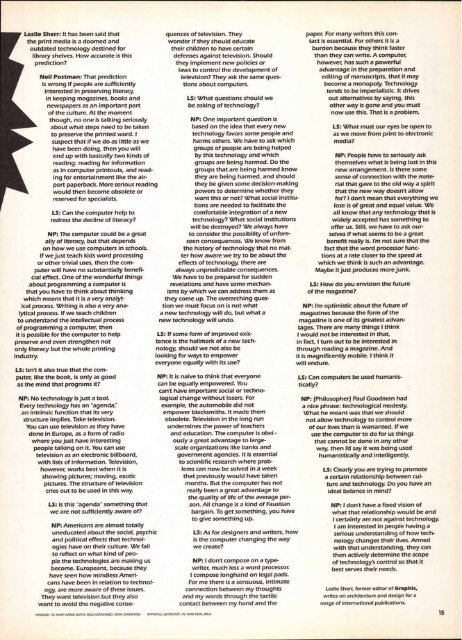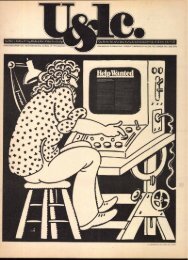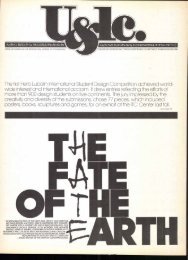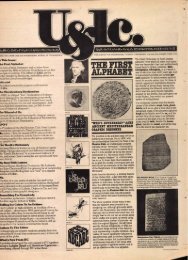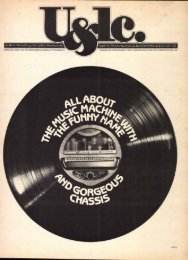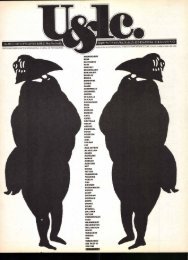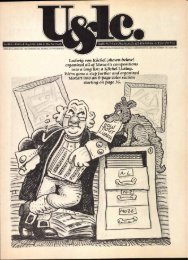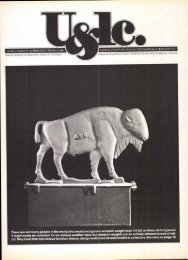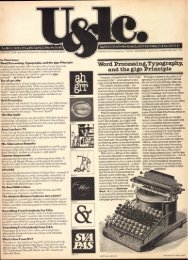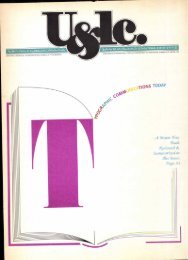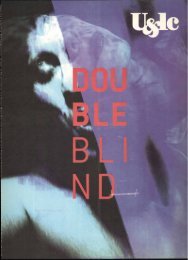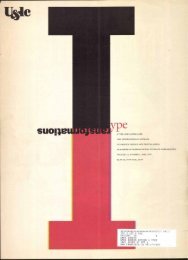Volume 19–4 (Low Res).pdf
Volume 19–4 (Low Res).pdf
Volume 19–4 (Low Res).pdf
Create successful ePaper yourself
Turn your PDF publications into a flip-book with our unique Google optimized e-Paper software.
Leslie Sherr: It has been said that quences of television. They paper. For many writers this conthe<br />
print media is a doomed and wonder if they should educate tact is essential. For others it is a<br />
outdated technology destined for their children to have certain burden because they think faster<br />
library shelves. How accurate is this defenses against television. Should than they can write. A computer,<br />
prediction? they implement new policies or however, has such a powerful<br />
laws to control the development of<br />
advantage in the preparation and<br />
Neil Postman: That prediction television? They ask the same ques- editing of manuscripts, that it may<br />
is wrong if people are sufficiently tions about computers. become a monopoly. Technology<br />
interested in preserving literacy, tends to be imperialistic. It drives<br />
in keeping magazines, books and LS: What questions should we out alternatives by saying, this<br />
newspapers as an important part be asking of technology? other way is gone and you must<br />
of the culture. At the moment<br />
now use this. That is a problem.<br />
though, no one is talking seriously<br />
NP: One important question is<br />
about what steps need to be taken based on the idea that every new LS: What must our eyes be open to<br />
to preserve the printed word. I technology favors some people and as we move from print to electronic<br />
suspect that if we do as little as we harms others. We have to ask which media?<br />
have been doing, then you will<br />
groups of people are being helped<br />
end up with basically two kinds of by this technology and which NP: People have to seriously ask<br />
reading: reading for information groups are being harmed. Do the themselves what is being lost in this<br />
as in computer printouts, and read- groups that are being harmed know new arrangement. Is there some<br />
ing for entertainment like the air- they are being harmed, and should sense of connection with the mateport<br />
paperback. More serious reading they be given some decision-making rial that gave to the old way a spirit<br />
would then become obsolete or powers to determine whether they that the new way doesn't allow<br />
reserved for specialists. want this or not? What social institu- for? I don't mean that everything we<br />
tions are needed to facilitate the lose is of great and equal value. We<br />
LS: Can the computer help to comfortable integration of a new all know that any technology that is<br />
redress the decline of literacy? technology? What social institutions widely accepted has something to<br />
will be destroyed? We always have offer us. Still, we have to ask our-<br />
NP: The computer could be a great to consider the possibility of unfore- selves if what seems to be a great<br />
ally of literacy, but that depends seen consequences. We know from benefit really is. I'm not sure that the<br />
on how we use computers in schools. the history of technology that no mat- fact that the word processor func-<br />
If we just teach kids word processing ter how aware we try to be about the tions at a rate closer to the speed at<br />
or other trivial uses, then the corn- effects of technology, there are which we think is such an advantage.<br />
puter will have no substantially benefi- always unpredictable consequences. Maybe it just produces more junk.<br />
cial effect. One of the wonderful things We have to be prepared for sudden<br />
about programming a computer is revelations and have some mechan- LS: How do you envision the future<br />
that you have to think about thinking isms by which we can address them as of the magazine?<br />
which means that it is a very analyt- they come up. The overarching quesical<br />
process. Writing is also a very ana- tion we must focus on is not what NP: I'm optimistic about the future of<br />
lytical process. If we teach children a new technology will do, but what a magazines because the form of the<br />
to understand the intellectual process new technology will undo. magazine is one of its greatest advanof<br />
programming a computer, then tages. There are many things I think<br />
it is possible for the computer to help LS: If some form of improved exis- I would not be interested in that,<br />
preserve and even strengthen not tence is the hallmark of a new tech- in fact, I turn out to be interested in<br />
only literacy but the whole printing nology, should we not also be through reading a magazine. And<br />
industry. looking for ways to empower it is magnificently mobile. I think it<br />
everyone equally with its use? will endure.<br />
LS: Isn't it also true that the computer,<br />
like the book, is only as good<br />
as the mind that programs it?<br />
NP: No technology is just a tool.<br />
Every technology has an "agenda;'<br />
an intrinsic function that its very<br />
structure implies. Take television.<br />
You can use television as they have<br />
done in Europe, as a form of radio<br />
where you just have interesting<br />
people talking on it. You can use<br />
television as an electronic billboard,<br />
with lists of information. Television,<br />
however, works best when it is<br />
showing pictures; moving, exotic<br />
pictures. The structure of television<br />
cries out to be used in this way.<br />
LS: Is this "agenda" something that<br />
we are not sufficiently aware of?<br />
NP: Americans are almost totally<br />
uneducated about the social, psychic<br />
and political effects that technologies<br />
have on their culture. We fail<br />
to reflect on what kind of peo-<br />
ple the technologies are making us<br />
become. Europeans, because they<br />
have seen how mindless Ameri-<br />
cans have been in relation to technol-<br />
ogy, are more aware of these issues.<br />
They want television but they also<br />
want to avoid the negative conse-<br />
NP: It is naive to think that everyone<br />
can be equally empowered. You<br />
can't have important social or technological<br />
change without losers. For<br />
example, the automobile did not<br />
empower blacksmiths. It made them<br />
obsolete. Television in the long run<br />
undermines the power of teachers<br />
and education. The computer is obvi -<br />
ously a great advantage to large-<br />
scale organizations like banks and<br />
government agencies. It is essential<br />
to scientific research where prob-<br />
lems can now be solved in a week<br />
that previously would have taken<br />
months. But the computer has not<br />
really been a great advantage to<br />
the quality of life of the average person.<br />
All change is a kind of Faustian<br />
bargain. To get something, you have<br />
to give something up.<br />
LS: As for designers and writers, how<br />
is the computer changing the way<br />
we create?<br />
NP: I don't compose on a typewriter,<br />
much less a word processor.<br />
I compose longhand on legal pads.<br />
For me there is a sensuous, intimate<br />
connection between my thoughts<br />
and my words through the tactile<br />
contact between my hand and the<br />
LS: Can computers be used humanistically?<br />
NP: [Philosopher] Paul Goodman had<br />
a nice phrase: technological modesty.<br />
What he meant was that we should<br />
not allow technology to control more<br />
of our lives than is warranted. If we<br />
use the computer to do for us things<br />
that cannot be done in any other<br />
way, then I'd say it was being used<br />
humanistically and intelligently.<br />
LS: Clearly you are trying to promote<br />
a certain relationship between culture<br />
and technology. Do you have an<br />
ideal balance in mind?<br />
NP: I don't have a fixed vision of<br />
what that relationship would be and<br />
I certainly am not against technology.<br />
I am interested in people having a<br />
serious understanding of how technology<br />
changes their lives. Armed<br />
with that understanding, they can<br />
then actively determine the scope<br />
of technology's control so that it<br />
best serves their needs.<br />
Leslie Sherr, former editor of Graphls,<br />
writes on architecture and design for a<br />
range of international publications.<br />
HEADLINE: ITC AVANT GARDE GOTHIC BOLD CONDENSED, BOOK CONDENSED INTRO/PULL QUOTE/TEXT: ITC ERAS DEMI, BOLD 15


